| (insert your NIE or newspaper logo here) |
Weekly Online LessonOnline Lesson ArchiveGrade Level: 6-8
|
Modern Living Made Easy
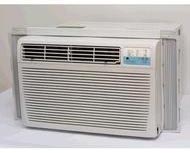 As summer's been heating things up, many people have become ever more reliant on refrigerators, air conditioners, and other conveniences to stay cool, comfortable, and have some fun in the sun.
As summer's been heating things up, many people have become ever more reliant on refrigerators, air conditioners, and other conveniences to stay cool, comfortable, and have some fun in the sun.
But such conveniences aren't reserved solely for summer use. For instance, we rely on coin-operated drink machines to dispense cold sodas on demand year-round, supermarket managers need to keep their meats and milk from spoiling, and thank goodness for indoor plumbing!
What kinds of modern conveniences do you rely on every day? In what ways do you think your life would be different without them? Try making a list of answers for each question.
Keep thinking about those questions, as you explore the history of some household wonders. Then, discover how the Industrial Revolution set the stage for the development of these and other innovations.
The History of Household Wonders
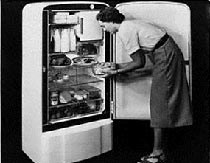 Let's get started by uncovering The History of Household Wonders at the History Channel.
Let's get started by uncovering The History of Household Wonders at the History Channel.
Read the introduction, then let's begin browsing in the Appliances section. What was the world's first appliance?
Now, meet Jack Santoro, American Appliance Historian. Which kinds of appliances does he say have had the most impact on society? In what ways did the washing machine improve people's quality of life? How has marketing and the appliances themselves changed over the years.
Next, let's browse around in The History of the Refrigerator. How did people preserve meats before refrigeration? What happens when the gas in a refrigeration system is compressed? What conditions in 1889 and 1890 boosted refrigeration sales?
Why do you think the mass production of refrigerators didn't get started until after World War I? When did freon replace sulphur dioxide as the common refrigerant?
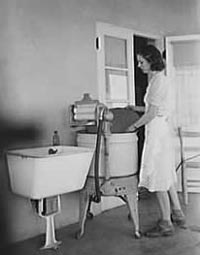 The next household wonders to look at is the Vacuum Cleaner and Washing Machine.
The next household wonders to look at is the Vacuum Cleaner and Washing Machine.
In what ways did vacuum technology improve over the years? What company developed the laundering system most commonly used today? Where was the first laundromat located, and what powered it?
Let's switch gears now, and look at how Plastics have shaped our lives -- literally. Review the History of Plastics Timeline, and read about The Nylon Riots.
What company invented nylon, and when did it happen? How did people respond to the fluctuations in the nylon supply? Do you think similar reactions to a shortage could happen today?
One modern convenience that most everyone uses -- at home and in public areas -- is Plumbing. And, of course, one of the best things about indoor plumbing is having flushing Toilets nearby.
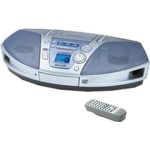 Why do you think it would be important that the wastes get carried away from areas where people live? What did Thomas Crapper invent? What are some new improvements that can help conserve water? How did scientists have to modify this basic system to create a Space Toilet?
Why do you think it would be important that the wastes get carried away from areas where people live? What did Thomas Crapper invent? What are some new improvements that can help conserve water? How did scientists have to modify this basic system to create a Space Toilet?
Lastly, what would our lives be without our Stereos? Browse the Timeline and discover the New Frontiers in Audio.
What famous film boasted the first commercial use of stereo sound? When were "walkmans" and CD players first introduced? In what ways has digitizing music improved quality and distribution?
What the Industrial Revolution Did for Us
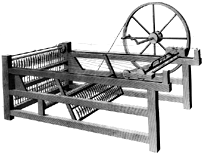 To find out What the Industrial Revolution Did for Us, we're going to travel to the UK.
To find out What the Industrial Revolution Did for Us, we're going to travel to the UK.
Read the introduction in the large box in the middle of the page. Instead of proceeding there, drop your cursor below that section, and click Changing Landscapes. This will open in a pop-up window, and you'll need to have the Flash Player installed to view it.
Once the module has loaded, review the description and instructions, then click Begin Exploring.
How did Cottage Industries, producing textiles, fuel Britain's pre-industrial economy? In what ways did Enclosures and Science help drive the Industrial Revolution? What do you think happened as Mining, Smelting, Medicine, Roads, and Steam Engines improved?
When you've explored the module completely, close that window to return to the site's home page. Now, return to the introduction and click More to continue.
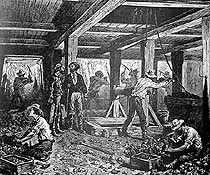 Dig deeper into the Industrial Revolution starting with the Material World.
Dig deeper into the Industrial Revolution starting with the Material World.
Why do you think coal, iron ore and water in close proximity were the fundamental materials that fueled the Industrial Revolution? What were some other developments that occurred at the same time?
Next, discover how Working Wonders transformed our stay-at-home agricultural societies into ones that were On the Move. Also, find out how Modern Medicine evolved and glimpse some of the ills of industrialization.
Move on to the next programs to learn how War Machines were, and still are, an important part of our industrialized societies, and that City Living, though difficult at first, became easier and more comfortable over the years.
Now, let's review those two questions posed at the beginning of the lesson: What kinds of modern conveniences do you rely on every day? In what ways do you think your life would be different without them?
Review your two lists. Can you think of any more items to add to either list? Also, ask older friends or family members if they can remember when any of today's modern marvels were first introduced. Can you think of any items that were created or improved upon in your own lifetime?
Newspaper Activities
Browse a current issue of Targetnewspaper. Look for any stories about improvements on existing household appliances (or other types of conveniences) or the introduction of a new one. Would having the item make your life or that of someone you know easier or more comfortable? Is it an item of necessity or luxury? Is it something that would relatively affordable for most people, or does it seem expensive? Also, review the newspaper's advertisements. Can you find any that are marketing appliances or plumbing supplies? Would any of these products exist without plastic or metal?
© Copyright 2004
Learners
Online,
Inc.
